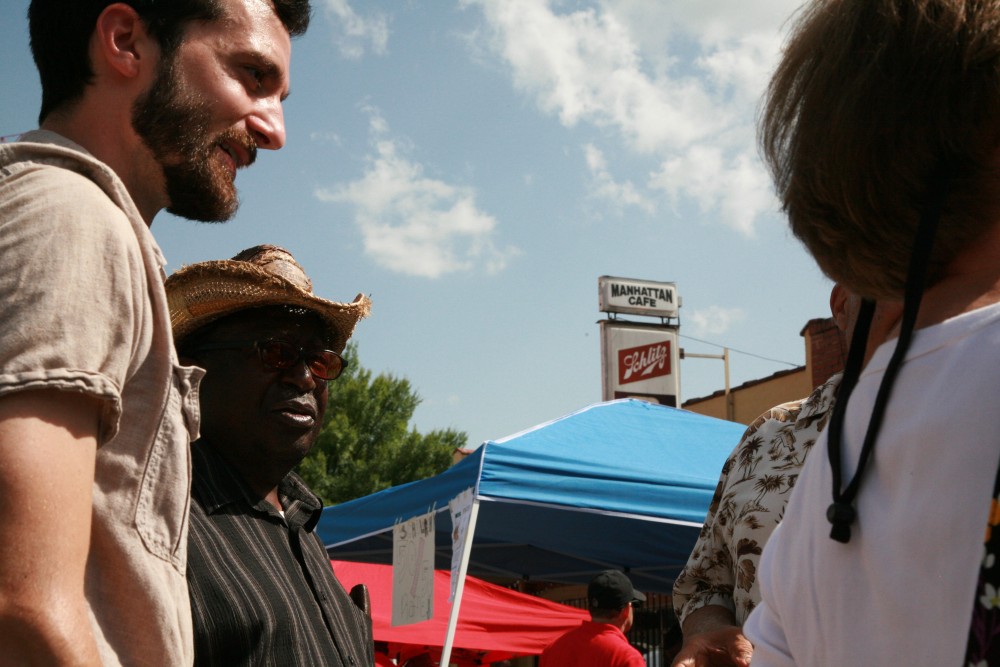New Series! DIGI grad student explores Athens’ Hot Corner
Part 1 of “The Hot Corner Project”
A project of Alexander M. Stephens (M.A. ’16)

If you’ve lived in Athens for any length of time, there is a good chance that you’ve heard of the Morton Theatre. The four-story brick building financed by Monroe Bowers “Pink” Morton in 1910 is a point of pride in this town One of only a handful of black vaudeville theatres still standing in the U.S., the Morton was restored and reopened in the early 1990s through a partnership between a local non-profit and the Athens-Clarke County government. Unless you’ve been around Athens for a number of years, though, it is unlikely that you’ve heard much about the black business district that grew up around the Morton Theatre at the intersection of Washington Street and Hull Street. “Hot Corner,” as the area became known, was a “mecca of black culture and commerce” according to Homer Wilson of Wilson’s Styling Shop on North Hull Street. That history remains, but it’s not evident to most casual observers who are more likely to notice the groups of white townies and graduate students who now occupy bars on the Corner most nights.
I was born and raised in Athens, went to Clarke Central High School, and then moved away for college. For almost three years after finishing school, I worked with residents of a historically black neighborhood in Chapel Hill, NC, which has been facing intense displacement pressures from rising rents and property taxes—a process many people refer to as gentrification. When I moved back to Athens and enrolled in the MA program in History at UGA, I began to notice ways in which spaces around Athens were changing, and I started to investigate how they were configured historically. I learned a little bit about Hot Corner. When I went to the Manhattan Cafe and The World Famous after that, I imagined that these bars located on either side of two black barber shops were indicative of national trends in which comparatively wealthy, predominately white populations have pushed out black-owned businesses and black residents. Then I interviewed Homer Wilson and realized I had a lot to learn.
Mr. Wilson explained in our 2014 interview for the Athens Oral History Project of the Richard B. Russell Library that Hot Corner maintains the “spirit” that it always had. He informed me that the reason his family closed Wilson’s Soul Food, the restaurant they operated next to their shop for 25 years, was because it was a lot of work and they were ready for a break. The family still owns the space, which they rent to the owners of The World Famous. Similarly, the Wade family, which owned and operated the Manhattan Cafe for decades, rents the property to Joey Tatum, who kept the name for the bar that he has run there for over 20 years. This was hardly the sort of displacement I had imagined it to be. In fact, the Wilsons and the Wades were collecting rent. I dropped the Hot Corner story for a while after that. I wasn’t sure what the story was. I’m still not sure, but I return to this question now because the fact is that on any given day, for more than half a century, there were dozens of black-owned enterprises conducting business on those few blocks of Washington Street and Hull Street and today, by my count, there are three: Brown’s Barber Shop, Wilson’s Styling Shop, and the recently arrived Dawg Gone Good BBQ. Even if the historic spirit of this place remains, the space has changed.
As a Graduate Research Assistant with the Willson Center Lab for Digital Humanities, my goal is to combine the traditional archival methods of historical research with the interviewing and digital audio editing methods of radio journalists to produce an audio documentary that will pose answers to three questions about Hot Corner: what changed there, when did it change, and—the million-dollar question for historians—why did it change? I’ll be using this blog to document the development of this project, which I am producing out of the DigiLab under the guidance of Stephen Berry of the UGA History Department and in collaboration with Broderick Flanigan, a local artist and teacher and the owner of Flanigan’s Portrait Studio. I will post notes on the production process to help guide future DigiLab students who are interested in similar projects. I will also use the blog to reflect on some of the key questions that tend to emerge in this sort of work, in hopes that it will help others who want to tell stories with local communities.
